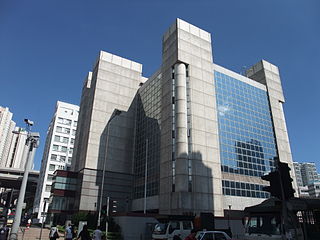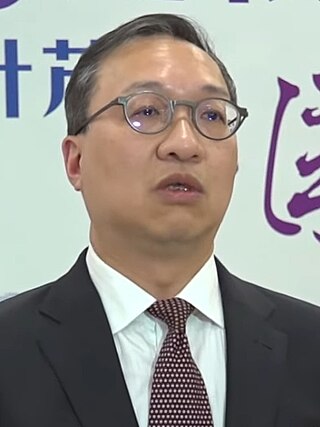
The Judiciary of the Hong Kong Special Administrative Region is the judicial branch of the Hong Kong Special Administrative Region. Under the Basic Law of Hong Kong, it exercises the judicial power of the Region and is independent of the executive and legislative branches of the Government. The courts in Hong Kong hear and adjudicate all prosecutions and civil disputes, including all public and private law matters.

The law of the Hong Kong Special Administrative Region has its foundation in the English common law system, inherited from being a former British colony and dependent territory. There are several sources of law, the primary ones being statutes enacted by the Legislative Council of Hong Kong and case law made by decisions of the courts of Hong Kong.

The High Court of the Hong Kong Special Administrative Region is a part of the legal system of Hong Kong. It consists of the Court of Appeal and the Court of First Instance; it deals with criminal and civil cases which have risen beyond the lower courts. It is a superior court of record of unlimited civil and criminal jurisdiction. It was named the Supreme Court before 1997. Though previously named the Supreme Court, this Court has long been the local equivalent to the Senior Courts of England and Wales and has never been vested with the power of final adjudication.

Magistrates' courts in Hong Kong have criminal jurisdiction over a wide range of offenses, and in general these offenses must only constitute two years' imprisonment or a fine of HK$100,000; in certain circumstances, sentences of three years may be imposed. All criminal proceedings must begin in the magistrates' courts; the Secretary for Justice may transfer cases to either the District Court or the Court of First Instance depending on the seriousness of the crime.
A judicial commissioner is person appointed on a non-permanent basis to a judicial office. In some countries, such as Malaysia and Singapore, judicial commissioners have the powers of full judges. In other jurisdictions their powers are limited.
The Lands Tribunal is a tribunal in Hong Kong that deals with legal disputes over land. It was established by the Lands Tribunal Ordinance. It is situated in the former Kowloon Magistracy building.

Arthur Leong GBS (1936–2010) was a judge in Hong Kong. He was Chief Judge of the High Court of Hong Kong from 2000 to 2003.
Michael Victor Lunn, GBS, KC, SC is a senior judge. He is Chairman of the Market Misconduct Tribunal and the Securities and Futures Appeals Tribunal in Hong Kong.
Ian Charles McWalters is Chairman of the Market Misconduct Tribunal and the Securities and Futures Appeals Tribunal in Hong Kong. He is a retired judge and former prosecutor.
The Honourable Mr Justice Aarif Tyebjee Barma is a Hong Kong judge, and currently serves as Justice of Appeal of the Court of Appeal of Hong Kong.
The Honourable Mr Justice Jeremy Poon Shiu-chor (潘兆初) is the Chief Judge of the High Court of Hong Kong and President of the Court of Appeal of Hong Kong.
The Judicial Officers Recommendation Commission is a statutory body in Hong Kong responsible for advising and making recommendations to the Chief Executive on judicial appointments and related matters established after the Handover in accordance with the Judicial Officers Recommendation Commission Ordinance. According to Article 88 of the Basic Law, the Chief Executive shall appoint judges on the recommendation of the Commission, suggesting that he or she is not empowered to make appointments on his or her own accord.
Clare-Marie Beeson, SBS is a New Zealand-born lawyer who served as a judge in the Hong Kong Judiciary for over 29 years.
Keith Yeung Kah-hung is a Judge of the Court of First Instance of the High Court of Hong Kong, and was previously the 5th Director of Public Prosecutions of Hong Kong.
Andrew Colin Macrae is Vice President of the Court of Appeal of Hong Kong.
Carlye Chu Fun-ling is a Hong Kong judge. She has served as a Vice President of the Court of Appeal of the High Court since November 2022.
Poon Siu-tung, also known as Tony Poon is a Hong Kong judge. He has served as a Judge of the Court of First Instance of the High Court since January 2019.

Barnabas Fung Wah, GBS is a Hong Kong judge. He has served as a High Court Judge since 2006.
Andrew Chan Hing-wai is a Hong Kong judge who hears and tries criminal cases. He has served as a Judge of the Court of First Instance of the High Court since August 2012.

Paul Lam Ting-kwok is a Hong Kong Senior Counsel who is the current Secretary for Justice.








